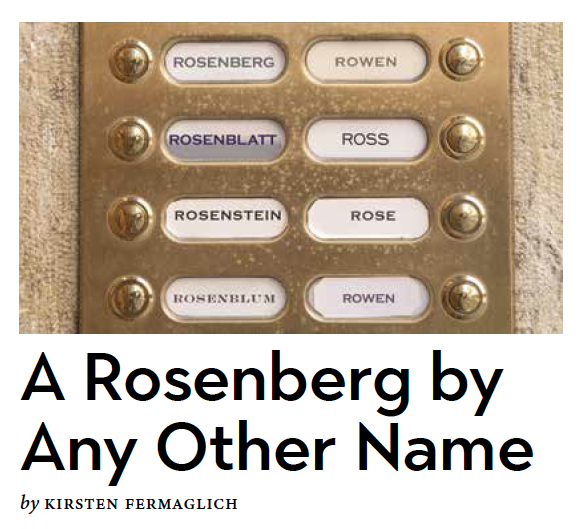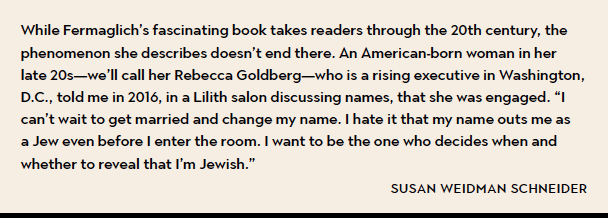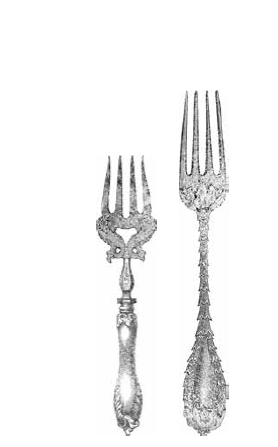Kirsten Fermaglich
A Rosenberg by Any Other Name

LARGE NUMBERS OF New Yorkers who petitioned to change their names were certain that their Jewish names, listed at the top of their application forms, had been a liability for them with employers and admissions officials: “[Golding] is foreign sounding, cumbersome, difficult to remember and easily confused with other names,” Pauline Golding explained in 1937 in her petition to change her name to Pauline Bennett Gould, continuing, “Petitioner’s foreignsounding name has hindered her in her work, in obtaining employment, and in her social life… . Your petitioner’s present name has consequently resulted in great loss to her both in business and socially.”
In response to name changing such as Gould’s, employers and universities also used application forms to ask applicants questions about their family names in order to determine their ancestry: What was their father’s surname? What was their mother’s maiden name? Had they or anyone else in their family changed their names? In a society where Jews’ racial status was uncertain, these subtle bureaucratic questions marked Jews as different and undesirable. Unlike today’s voluntary affirmative-action questions on employment applications, applicants were required to answer these questions and thus either identify themselves as Jewish or lie about their identity. By making these questions standard on application forms, bureaucrats actually helped to construct Jews’ inferior status in American social and economic life— either intentionally or unintentionally.
What did it mean for Jews to live in a world that was quietly, politely, and privately laced with questions designed to mark them as different? How could they be sure they were facing discrimination? How did they understand rejections from schools, employers, and social organizations? How did shadowy, unacknowledged limitations shape their daily lives? And how did these limitations shape their identities as Jews?
The insidious nature of American antisemitism may have limited ordinary Jews’ understanding of themselves as victims, as well as their capacity to protest openly. Pauline Golding’s petition did not state that she had been the victim of prejudice or antisemitism, and Golding was not alone. Of the thousands of petitions found in the New York City Civil Court, virtually none mentioned antisemitism. They may have been uncertain of what they were facing—they had no proof of discrimination—or they may have been embarrassed by and ashamed of rejections that could be interpreted as personal and individual, rather than racially motivated. The unofficial nature of American antisemitism encouraged many Jews to resist discrimination by using bureaucratic name-change petitions to reshape their personal identity, rather than civil rights activism to change an unfair society. Name changing thus offers us a window into the corrosive nature of American antisemitism.
Name changing also shows us how deeply intertwined race has been with Jewish economic and social mobility in the United States. Employers and universities tried to weed out Jews precisely because they believed there were too many of them in workplaces and on campuses. As Jews achieved economic success, moving into the middle class faster than other white immigrant groups did in the early 20th century, their efforts at social mobility were severely scrutinized. And it is this interplay between Jewish success, antisemitic restriction, and Jewish name changing that needs to be considered. Historians have typically focused on Jews’ economic success in the United States without much consideration of the obstacles that stood in their way. But the petitions found in New York City Civil Court testify to the significant obstacles Jews faced when they sought middle-class jobs. Dora Sarietzky, a secretary, described her frustratingly long search for work before a name change with a phrase that was repeated in petition after petition: “My name proved to be a handicap.” Jews often felt that their success in the middle class required them to tailor their names to present a more acceptable outward appearance on the job.
Name-change petitions also require us to consider the importance of women and children in stories of Jews’ economic success. The most recent, complicated, and nuanced portraits of Jewish economic life in America have mostly been stories of men. But Jews, far more than any other group in New York City then or since, developed a pattern of family name changing, in which husbands and wives changed their names together, parents changed their names with their sons and daughters, and adult brothers brought their wives and children together to change names on one petition. Sometimes it was children who pushed their mothers and fathers to change their name, as they faced hostility at school or feared that they would not be admitted to college. At other times, it was women— either alone or with family members— who instigated the name change. Melanie Kaye/Kantrowitz’s mother remembered that she threatened to call her first child Forsythia Kantrowitz until her husband changed their surname in 1942. The intense stigma that Jewish women faced as they sought to become secretaries or saleswomen led surprisingly large numbers of single Jewish women, such as Pauline Golding, to change their names— even when they knew they might change them again upon marriage. Of course, in some ways, this may not be as surprising as we imagine: changing last names was a normal practice for women, who were always required to reshape their identities upon marriage. Nonetheless, women and children played a crucial and often forgotten role in confronting antisemitism and shaping Jewish economic success. Name changing helps us remember how important they were in this process.
Throughout the first half of the 20th century, an increasing number of individual petitions were filed by women who clearly hoped to find or keep their jobs. By the 1930s, they were 30 percent of all petitioners to the City Court of the City of New York. For example, the secretary Beatrix R. Salomon filed a single petition to change her name to Salmon, explaining that she “had endeavored to change her occupation to find a new position which promises advances in salary and position, but has found difficulty in procuring a position commensurate with her ability by reason of the name she now has.” Pauline Golding explained that she worked both selling and writing copy in radio advertising but that her “foreign sounding name [had] hindered her in her work, in obtaining employment and in her social life.” Unemployed, she sought to change her name to Pauline Bennett Gould. Single women seeking employment (or already employed) in office work, sales, advertising, journalism, and entertainment petitioned to change their names in the hopes of finding jobs in a market restricted by both gender and ethnic discrimination.
Indeed, even on petitions submitted by families, many women were actually daughters or sometimes even wives either seeking or already engaged in white-collar work. Helen, Lillian, and Edna Sicherman all lived with their parents and worked as private secretaries. In the family petition to change the parents’ and seven siblings’ name to Sherman, the three women each testified that they had “been known by this proposed name among all [their] business associates and acquaintances for the past 15 years and [had] done business and received a large amount of correspondence under the said name.” In 1937, the entire Lefkowitz family petitioned to change their name to Lynford, including 21-year-old daughter Selma Ruth Lefkowitz, who explained that she was assistant manager of an apartment building and had already assumed the name Lynford for business purposes.
With growing numbers of women during this era able to find white-collar work as saleswomen, stenographers, and typists— and even more creative jobs such as writing, acting, and photography—it is unsurprising that women seeking these positions believed a name change would benefit their search. Native-born Jewish women were actually seeking this whitecollar work in much larger numbers than were other second-generation ethnic women, such as Italian Americans. These large numbers help to explain the increasing percentages of both single women and Jews in the name-change petitions.
Indeed, some evidence suggests that Jewish women, even more than Jewish men, may have faced economic discrimination as they sought office work. The sociologist Alfred Luverne Severson found that the antisemitic employment advertisements in the Chicago Tribune in the 1920s and 1930s were specifically geared toward Jewish women entering whitecollar secretarial work. Advertisements for female workers—and particularly for stenographers and typists—discriminated against Jews at much higher rates than did advertisements for male workers. Severson’s conversations with “men in thirty-seven employment agencies” highlighted the antisemitism directed particularly toward second-generation Jewish women, noting that all the employment agents offered anecdotes about the inappropriate behavior and appearance of Jewish women in the workplace, while ignoring the subject of Jewish men entirely. In a study of the American Jewish press during this era, the anthropologist Riv-Ellen Prell has found that it was the unsuitable bodies and voices of Jewish women, much more than those of men, that were lampooned, lamented, and policed as they sought jobs in the U.S. marketplace. Julia Weber wrote in the English-language Jewish press in 1918: “While there are thousands of splendid Jewish girls who are ladies in every sense of the word, yet there are others who… help bring severe criticism upon all Jewish girls. Her voice is either loud and harsh or shrill. She does not realize that this stamps her as uncultured and vulgar.”
Kirsten Fermaglich is Associate Professor of History and Jewish Studies at Michigan State University. Her previous publications include American Dreams and Nazi Nightmares and the Norton Critical Edition of Betty Friedan’s The Feminine Mystique, coedited with Lisa Fine.

This essay is adapted from A Rosenberg by Any Other Name: A History of Jewish Name Changing in America, by Kirsten Fermaglich, New York University Press, 2018. Used with permission.
Money and Meaning
The articles in this special section:
Cliques and Class in Hebrew School
Shayna Goodman
Teaching wealthy kids shocks Goodman back to the longing, exclusion and shame of her own school days.

Fiction: The Proper Care of Silver
Emily Franklin
Social class and gender roles are at play in keeping the house clean.

Who Can Pay for an Abortion?
Chanel Dubofsky
Our ideal of reproductive justice rests on a shaky pedestal. Abortion funds are bridging an unsteady present and a frightening future.
In Med School Before Roe v. Wade
Julie R. Ingelfinger, M.D.
She was a young nursing student whose name and face I still remember five decades later, but I will just call her “Jane Roe.”

A Rosenberg by Any Other Name
Kirsten Fermaglich
In the 20th century, many women changed their Jewish-sounding surnames to avoid workplace anti-Semitism and to get a job. What was gained --and what was forfeited?
 Please wait...
Please wait...